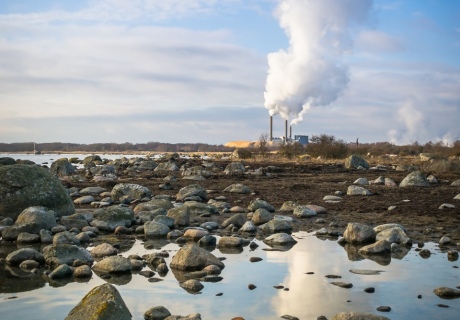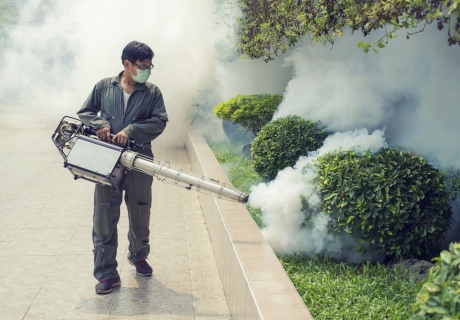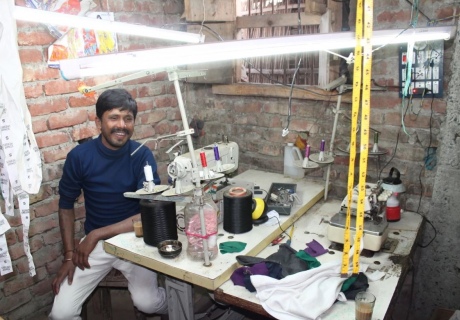9 up-and-coming projects in climate change and the environment
by Simon Levey

Facing challenges of water shortages, air pollution, energy supply and social inequality, Imperial researchers are striving to make a better world.
The Paris Agreement on combatting climate change and the UN’s Sustainable Development Goals have sent a clear message that climate change and our environment are among the top priorities for governments and their citizens around the world.
The Grantham Institute plays a key role in Imperial College London’s strategy. Shifts in the political landscape since our last Outlook have given the Institute’s mission renewed importance.
– Alice P. Gast
President
As governments look to put the words of these international treaties into action, Imperial College London researchers are playing their part alongside an up-swell of activity from individual people, organisations and businesses.
Details of the activities are published today in the Grantham Institute Outlook 2016-17.
The Grantham Institute is one of Imperial’s global challenge institutes, which aims to shape the College’s priorities in this area: to inform government, business and industry, and civil society; to create and appraise expert knowledge; to train the next generation of leaders; and to support innovation.
"The Grantham Institute plays a key role in Imperial College London’s strategy. It catalyses our efforts to inform policy through our research, provides a focal point internally and externally for climate change and environmental research, and provides a multidisciplinary education for the leaders of tomorrow,” said Professor Alice P. Gast, President of Imperial College London.
“Shifts in the political landscape since our last Outlook have given the Institute’s mission renewed importance.”
This week, the Grantham Institute also welcomes 30 new PhD students to its Science and Solutions for a Changing Planet Doctoral Training Partnership, and invites organisations to partner with the students to seek solutions to achieving the UN Sustainable Development Goals, in its new Innovating for Sustainable Development programme.
Below we look at nine ways in which researchers are contributing to tackling some pressing challenges in climate change and the environment:
1. Identifying the origin of greenhouse gases
Measuring the atmosphere could help assess whether the Paris Agreement targets are being met. Physicist and Grantham Lecturer Dr Heather Graven is leading a new €1.5 million European Research Council project to develop an analysis that distinguishes between greenhouse gases from fossil fuels and those from natural sources. The new measurements could help to validate the accounting of emissions to the United Nations and help to determine how natural ecosystems respond to climate change.

2. Helping deliver clean and affordable energy
The International Energy Agency (IEA) is taking steps to become truly global and involving the interests of all nations. Grantham Institute Senior Policy Fellow, Mr Neil Hirst, is working with the Chinese government and its national Energy Research Institute (ERI) to aid China’s full and equal participation in the work of the IEA. Together with new commitments by the G20 leaders, they are aiming to deliver universal affordable energy, economic growth and development, as well as meeting climate targets. The Grantham Institute has signed a new agreement with the ERI, to collaborate on energy research, policy and education.

3. Protecting animals and humans from disease
Dr Kris Murray, Grantham Lecturer in Global Change Ecology, is leading a new project to safeguard both animal biodiversity and human health by targeting emerging infectious diseases, such H5N1 flu, dengue fever and malaria. With funding from the Australian Commonwealth Scientific and Industrial Research Organisation, PhD student Mr Hiral Shah will seek to identify policies that can benefit health and biodiversity in areas of South Asia where urban and rural environments meet.

4. Bringing solar energy to rural communities
Grantham Institute PhD student Phil Sandwell and Professor Jenny Nelson, Head of the Grantham Institute’s mitigation team, are working with energy start-up Oorja to bring electricity to people living in rural parts of Uttar Pradesh, India. Introducing electric lighting to replace kerosene oil lamps improves air quality for the residents, as well as reducing greenhouse gas emissions. Thanks to funding from Research Councils UK Energy Programme, they have commissioned an experimental mini-grid powered by solar panels. It will be used to develop better models of energy generation and demand, which will help the company meet local electricity needs.

Image: Oorja Solutions
5. Understanding the future for fossil fuels
The rise of new low-carbon technologies has created an uncertain outlook for oil and coal industries. These technologies have the potential to reduce the global market for fossil fuels and affect future investment in the industry. Grantham Institute Research Associate Dr Tamaryn Napp is looking at how the rapidly falling costs of electric vehicles and solar panels drives their sales, and the consequences for fossil fuel demand.

6. Safeguarding Ganges river water
Imperial researchers are beginning a £1.2 million project to investigate how water is managed in South Asia. The fertile plain of the Ganges river is home to millions of people whose wellbeing directly depends on the availability of water, and the infrastructure that delivers it. Dr Ana Mijic from the Department of Civil and Environmental Engineering, and her team, work to better understand how water is used and how climate change affects water resources. With collaborators in the UK and India, and support from the Natural Environment Research Council and Newton-Bhabha Fund, they aim to improve environmental conditions and wellbeing for local people by engaging farmers and regulators in managing water systems sustainably.

7. Cleaning up polluted air
In Malawi, Africa, Dr Jem Woods from the Centre for Environmental Policy is looking into cooking stoves that put waste plant matter, such as macadamia shells and maize cobs, to good use. Millions of the poorest people here cook on traditional wood fires, suffering the adverse effects of smoke inhalation. Alternative low-tech but modern ‘gasifier’ stoves could be cheaper and less damaging to health, whilst using agricultural wastes as fuel would reduce deforestation and greenhouse gas emissions. His team aims to highlight the benefits, and find ways to get more people using the stoves.

8. Winning hearts and minds
World leaders have agreed to reduce their countries’ greenhouse gas emissions, but what will it take for the person on the street to change their behaviour? Grantham Affiliates Dr Mark Workman, from the Energy Research Partnership, and Dr Felicity Mellor, from the School of Professional Development, aim to get a grip on this socially sensitive question, along with new PhD student Ms Geraldine Satre Buisson. A new network of communications theorists, professionals and climate change scientists will develop a best-practice guide for communicating about climate change and measure its impact on the public.

Image: IISD reporting services
9. Innovating for Sustainable Development
The Grantham Institute invites organisations to partner with the best PhD students to seek solutions to achieving the UN Sustainable Development Goals. Start-ups, corporates, NGOs and policymakers should learn more about the Innovating for Sustainable Development programme through the Grantham Institute website. The programme runs from November 2016 to March 2017 and is funded by the Natural Environment Research Council.

Article supporters
Article text (excluding photos or graphics) © Imperial College London.
Photos and graphics subject to third party copyright used with permission or © Imperial College London.
Reporter
Simon Levey
Communications Division